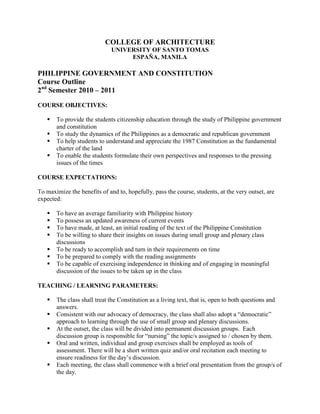
Philgov
- 1. COLLEGE OF ARCHITECTURE UNIVERSITY OF SANTO TOMAS ESPAÑA, MANILA PHILIPPINE GOVERNMENT AND CONSTITUTION Course Outline 2nd Semester 2010 – 2011 COURSE OBJECTIVES: To provide the students citizenship education through the study of Philippine government and constitution To study the dynamics of the Philippines as a democratic and republican government To help students to understand and appreciate the 1987 Constitution as the fundamental charter of the land To enable the students formulate their own perspectives and responses to the pressing issues of the times COURSE EXPECTATIONS: To maximize the benefits of and to, hopefully, pass the course, students, at the very outset, are expected: To have an average familiarity with Philippine history To possess an updated awareness of current events To have made, at least, an initial reading of the text of the Philippine Constitution To be willing to share their insights on issues during small group and plenary class discussions To be ready to accomplish and turn in their requirements on time To be prepared to comply with the reading assignments To be capable of exercising independence in thinking and of engaging in meaningful discussion of the issues to be taken up in the class TEACHING / LEARNING PARAMETERS: The class shall treat the Constitution as a living text, that is, open to both questions and answers. Consistent with our advocacy of democracy, the class shall also adopt a “democratic” approach to learning through the use of small group and plenary discussions. At the outset, the class will be divided into permanent discussion groups. Each discussion group is responsible for “nursing” the topic/s assigned to / chosen by them. Oral and written, individual and group exercises shall be employed as tools of assessment. There will be a short written quiz and/or oral recitation each meeting to ensure readiness for the day’s discussion. Each meeting, the class shall commence with a brief oral presentation from the group/s of the day.
- 2. The class shall promote problem-posing and problem-solving approaches to learning. Independent research/study for groups and individuals is highly encouraged. The study of the constitution will be issue-oriented and infused with both local and global perspectives. CLASROOM PROTOCOLS: Basic classroom decorum (see Student Handbook) Absences beyond 7 mean WP. Three counts of tardiness are equal to one absence. Special quiz or recitation is given only on exceptional cases. REQUIREMENTS: Recitation Group activities Quizzes Major exams Paper GRADING SYSTEM: Class standing 50% Major exams (prelim / final) 30% Major paper 20% (10% oral + 10% written) The Government of the Philippines, also known as the Philippine National Government is the national government of the unitary state of the Republic of the Philippines. It is a presidential, representative, and democratic republic where thePresident of the Philippines is both the head of country and the head of governmentwithin a pluriform multi-party system. The government has three interdependent branches: the legislative branch, the executive branch, and the judicial branch. The powers of the branches are vested by the Constitution of the Philippines in the following: Legislative power is vested in the two-chamber Congress of the Philippines—the Senate is the upper chamber and the House of Representatives is the lower chamber. Executive power is exercised by the government under the leadership of the President. Judicial power is vested in the courts with the Supreme Court of the Philippines as the highest judicial body.
